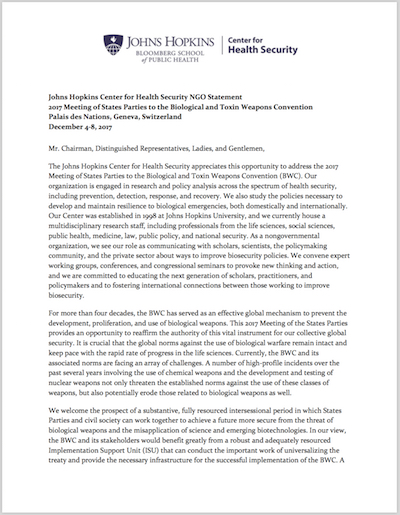Center for Health Security delivers NGO statement at 2017 Meeting of States Parties to the Biological and Toxin Weapons Convention
Center News

December 05, 2017 – A delegation of staff from the Johns Hopkins Center for Health Security is attending the 2017 Meeting of States Parties to the Biological and Toxin Weapons Convention (BWC) at the United Nations in Geneva, Switzerland, from Dec. 4-8, alongside representatives from 179 nations that have signed and ratified the treaty.
Invited non-governmental organizations have the opportunity to address country delegations and other NGOs present with a statement during an opening public session. In its statement, the Center urged the BWC and States Parties to facilitate engagement with the broader international scientific and policy community to strengthen global norms against the use of biological warfare by keeping pace with the rapid rate of progress in the life sciences.
“Because biological research occurs mostly outside the direct control of governments and sometimes without oversight, the responsibility for transparency, accountability, and responsible use often falls to scientists themselves,” said Director Tom Inglesby, MD, who delivered the Center’s statement on Tuesday, Dec. 5. “It is critical that these stakeholders become more involved, both to identify and assess emerging risks and threats and to work together to ensure safe, responsible, and peaceful use of science.”
While in Geneva, Center staff are meeting with participants from the Center’s ongoing multilateral biosecurity dialogue among the United States and southeast Asian countries and bilateral dialogue between the United States and India. They will continue to discuss how these dialogues can be useful in addressing regional and global biological weapons threats.
BWC States Parties meet annually. The goal for this year’s meeting is to set the BWC’s agenda for subsequent years leading up to its Ninth Review Conference in 2021.
When it took effect in 1975, the BWC was the first multilateral disarmament treaty to ban an entire category of weapons. The BWC effectively prohibits the development, production, acquisition, transfer, stockpiling, and use of biological and toxin weapons and is a key element in the international community’s efforts to address the proliferation of weapons of mass destruction.
More information about the BWC is available at un.org. More information about the 2017 Meeting of States Parties is available at unog.ch.
Read the full statement here.
About the Johns Hopkins Center for Health Security:
The Johns Hopkins Center for Health Security works to protect people from epidemics and disasters and build resilient communities through innovative scholarship, engagement, and research that strengthens the organizations, systems, policies, and programs essential to preventing and responding to public health crises. The Center is part of the Johns Hopkins Bloomberg School of Public Health and is located in Baltimore, MD.
